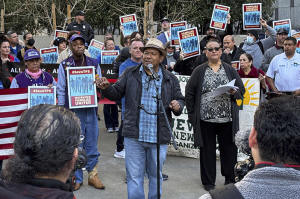Appeals court blocks Trump administration from ending legal protections
for 600,000 Venezuelans
[August 30, 2025]
By JANIE HAR
SAN FRANCISCO (AP) — A federal appeals court on Friday blocked President
Donald Trump's plans to end protections for 600,000 people from
Venezuela who have had permission to live and work in the United States,
saying that plaintiffs are likely to win their claim that the Republican
administration's actions were unlawful.
A three-judge panel of the 9th U.S. Circuit Court of Appeals unanimously
upheld a lower court ruling that maintained temporary protected status
for Venezuelans while TPS holders challenge actions by Trump’s
administration in court.
The 9th Circuit judges found that plaintiffs were likely to succeed on
their claim that Homeland Security Secretary Kristi Noem had no
authority to vacate or set aside a prior extension of temporary
protected status because the governing statute written by Congress does
not permit it. Then-President Joe Biden’s Democratic administration had
extended temporary protected status for people from Venezuela.
“In enacting the TPS statute, Congress designed a system of temporary
status that was predictable, dependable, and insulated from electoral
politics,” Judge Kim Wardlaw, who was nominated by President Bill
Clinton, a Democrat, wrote for the panel. The other two judges on the
panel were also nominated by Democratic presidents.
In an email, a spokesperson for the Department of Homeland Security
blasted the decision as more obstruction from “unelected activist”
judges.
“For decades the TPS program has been abused, exploited, and politicized
as a de facto amnesty program," the email read. “While this injunction
delays justice and undermines the integrity of our immigration system,
Secretary Noem will use every legal option at the Department’s disposal
to end this chaos and prioritize the safety of Americans.”
Congress authorized temporary protected status, or TPS, as part of the
Immigration Act of 1990. It allows the secretary of DHS to grant legal
immigration status to people fleeing countries experiencing civil
strife, environmental disaster or other “extraordinary and temporary
conditions” that prevent a safe return to that home country. The terms
are for six, 12 and 18 months.
The appellate judges said the guaranteed time limitations were critical
so people could gain employment, find long-term housing and build
stability without fear of shifting political winds.
But in ending the protections soon after Trump took office, Noem said
conditions in Venezuela had improved and it was not in the U.S. national
interest to allow migrants from there to stay on for what is a temporary
program. It's part of a broader move by Trump’s administration to reduce
the number of immigrants who are in the country either without legal
documentation or through legal temporary programs.
U.S. District Judge Edward Chen of San Francisco found in March that
plaintiffs were likely to prevail on their claim that the administration
had overstepped its authority in terminating the protections. Chen
postponed the terminations, but the Supreme Court reversed him without
explanation, which is common in emergency appeals.
It is unclear what effect Friday’s ruling will have on the estimated
350,000 Venezuelans in the group of 600,000 whose protections expired in
April. Their lawyers say some have already been fired from jobs,
detained in immigration jails, separated from their U.S. citizen
children and even deported.

[to top of second column]
|

Immigrant rights supporters hold a rally in front of the federal
courthouse in San Francisco, on Monday, March 24, 2025, ahead of a
hearing for a lawsuit against the Trump administration. (AP
Photo/Terry Chea, File)

Protections for the remaining 250,000 Venezuelans are set to expire
Sept. 10.
“What is really significant now is that the second court unanimously
recognized that the trial court got it right,” said Emi MacLean, a
senior staff attorney with the ACLU Foundation of Northern
California representing plaintiffs.
She added that while the decision might not benefit immediately
those people who have already lost their status or are about to lose
their status, Friday's ruling “should provide a path for the
administration’s illegal actions related to Venezuela and TPS to
finally be undone.”
A court declaration provided by plaintiffs showed the turmoil caused
by the Trump administration and Supreme Court decision.

A Washington woman who worked in restaurants was deported in June
along with her daughters, 10 years and 15 months old, after ICE
officers told her to bring her children to an immigration check-in.
The father of the baby, who is a U.S. citizen, remains in the U.S.
while the woman tries to figure out what to do.
Also in June, a FedEx employee appeared in uniform at his required
immigration check-in only to be detained, the court declaration
states. He slept for about two weeks on a floor, terrified he would
be sent to El Salvador's notorious CECOT prison. His wife cannot
maintain the household on her earnings.
“I am not a criminal,” he said in the declaration, adding that
“immigrants like myself come to the United States to work hard and
contribute, and instead our families and lives are being torn
apart."
Millions of Venezuelans have fled political unrest, mass
unemployment and hunger. Their country is mired in a prolonged
crisis brought on by years of hyperinflation, political corruption,
economic mismanagement and an ineffectual government.
Attorneys for the U.S. government argued the Homeland Security
secretary’s clear and broad authority to make determinations related
to the TPS program were not subject to judicial review. They also
denied that Noem's actions were motivated by racial animus.
But the appellate judges said courts clearly had jurisdiction in
cases where the actions were unlawful. They declined to address
whether Noem was motivated by racial animus.
All contents © copyright 2025 Associated Press. All rights reserved |